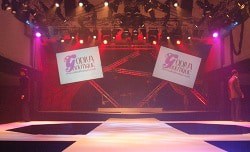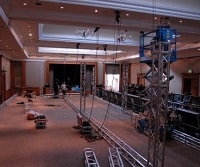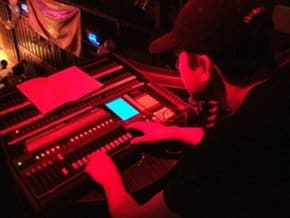A lighting engineer designs and implements the lighting arrangements for live and pre-recorded media events such as concerts, television shows, movies and public events.
A lighting engineer is crucial to any production.
Lighting is key to setting ambiance, mood and style to any staged event.
At the outset, a lighting engineer will be directed in his work by the production director, who will explain what he wants from the lighting and it is the lighting engineer’s job to bring that vision to a reality.
Working with stagehands, riggers and electricians, the lighting engineer sets up configurations of lights that are then remotely controlled via a control board.
During the production, the lighting engineer may sit at this board and set different lighting effects in action at pre-determined cues.
Often, series and sequences of effects are configured with computer programming.
Salary
Salary for lighting engineers is vastly dependent on experience.
As many jobs are on a short contractual basis, it is common for freelancers to be paid a daily rate rather than a yearly salary.
The type of production also influences pay greatly.
- A lighting engineer working in theatre can expect to earn around £15,000 – £30,000 a year depending on experience.
- A lighting engineer working on a television show may claim the standard £240 per day rate for 10 hours. If they are working for a feature film production, then this rate increases to £255-£270 a day depending on the film’s budget. (Data from The Broadcasting, Entertainment, Cinematograph and Theatre Union (BECTU) 2016)
Qualifications
There are a variety of qualifications on offer for aspiring lighting engineers at University and College level.
Experience is highly valued in the industry so don’t rely on qualifications alone to get a foot in the door.
Any of the courses below will qualify you to work as a lighting engineer:
- BTEC National Award (NA) in Stage Lighting, Rigging and Operation
- BA in Theatre Practice in Lighting Design
- BA in Theatre Practice in Production Lighting
- BSc in Lighting Design and Technology
You can search for a list of lighting engineer courses by UK region and specialism at PLASA’s Professional Development Centre
Skills

As a lighting engineer the following attributes will stand you in good stead.
- Ability to work as part of a team
- Creative vision
- Ability to follow instructions closely
- Good at manual work
- Good mathematical ability
- Comfortable with heights
- Good level of personal fitness and endurance
- Great communication skills
- Ability to delegate
Working Conditions
The working environment of a lighting engineer can vary hugely depending on the type of production being worked on.
Work can take place in a television studio, outside at an open air concert or in a theatre setting.
Hours conform to a production schedule and are often long, working through the night or day on 12 hour shifts.
Heavy equipment and the physical nature of the job make it tiring.
The majority of people working in the lighting industry are male.
There is a large element of physical danger in the profession of lighting engineer.
The high platforms and scaffolding, electrical wiring and heavy lights involved in lighting present the opportunity for serious accidents if handled incorrectly.
This is exacerbated by a potentially high number of people working on different aspects of a production and means that a large part of a lighting engineer’s role relates to identifying and minimising danger in the workplace.
Experience
Experience is often regarded as highly, if not more so, than official qualifications.
If you are really serious about becoming a lighting engineer then seek out work experience of any kind and be prepared to work for little or no money when starting out.
You could find work experience in any of the following:
- Student or amateur productions
- Fringe art festivals
- Lighting companies
- The BBC which runs highly sought after work placements; you can find out more here
Employers
Qualified lighting engineers are frequently contracted by:
- Stage and theatre companies
- Clubs and music venues
- Specialist audio visual installation companies
- Broadcast television networks
- Film studios
Career Progression
Qualified electricians can go on to work as lighting technicians in film and television productions.
Qualified lighting engineers often go on to become lighting designers on large scale projects where their manual involvement will be less and they will be more concerned with design and management of a team of technicians.
Image

Also known as…
- Lighting designer
- Lighting technician
Related Jobs
- Electrician
- Sound Technician
- Photographer
- Theatre Technician
- Director
- Stage Manager
What’s it really like?
Tom Spink, 22 years old, is a lighting engineer currently working for Catalyst FSP Lighting in Perth, Scotland.
How long have you been working in the lighting industry?
Well I’ve been working freelance for about four years.
I had been working for companies casually since I moved to Edinburgh and now I’ve got a full time job for one of the companies that I had been freelancing for.
What did you do before this job and what got you into lighting?
I worked in a leisure centre while I was at college, working in an ice rink just to get some money before I studied software engineering, at the University of Edinburgh.
Although my degree related to some aspects of lighting, I gained almost all of my expertise through working with companies, rather than any official qualifications.
Ever since I was young I’ve been interested in lights.
Whenever I went to a pantomime or the theatre I was always looking at the guys doing the lights rather than the actual show.
My first opportunity came about at school doing a spot follow for a student production.
What do you do in a typical day at work?
It’s hard to say as there isn’t really a typical one.
When there’s no event on I’m in the warehouse repairing things.
When it comes to an actual event there’s various stages involved with each one.
There’s pre-production which could mean talking to a director, finding out their wishes, finding out how they want the lights to look and coming up with a design.
Then there’s also planning to do, with making power calculations and the safest way to carry out a job, looking at the safety factors.
The next stage is getting on site and rigging up the system.
That involves a lot of other people, such as riggers, who will go in there to install the rigging points and the safety mechanisms.
It’s the job of the lighting designer/ engineer to co-ordinate the other crew.
I enjoy getting involved in the rigging myself, as rigging is another passion of mine.
But usually the designer will rely on rigging staff, and be there simply to oversee the job.
Then it comes down to the programming of the lights, sitting down with the director.
There are different disciplines, for instance theatre and rock n roll.
They all have a different design and different programming so you sit down with the director and decide how things are going to be used.
What do you like about the job?
I really like lighting bands.
I love rock n roll; that’s what I’m really interested in.
It’s great when you’ve created something that people are enjoying and you can be proud of.
What do you dislike about the job?
Sometimes it can involve a lot of travelling to different places.
It’s not so bad as you usually get a pay allowance for it but it can be quite boring going up and down the county.
What advice would you give to someone thinking of doing this job?
One of the most important things in the industry is experience and getting into it.
It’s not about qualifications.
You are going to have to start out small but there’s always a company out there looking for someone to carry cables around, feed cables through etc.
Based on that experience you’ll be able to get bigger and better jobs and grow your own skill set.
What job do you think you might do after this role in terms of progressing your career?
What I’m really interested in is getting into lighting for high profile TV shows like the X-factor – high profile rock n’ roll.
I would love to get into that!
What other inside-information can you give to help people considering this career?
Just going back to what I said about experience really.
Occasionally it comes down to who you know.
You might get a lucky break.
It’s always important to know what you’re doing if someone asks you to do something.
It’s OK to ask if you don’t know.
Don’t ever try and do anything you’re not sure about because it could lead to an unsafe situation, or someone getting annoyed
Do you mind us publishing your salary?
Typically you get paid a daily rate for a job and you can increase that daily rate as time goes by.
I can charge a bit more now as people know and like me.
It also depends on the kind of role, e.g. if you are working as a rigger, a controller or a chief.
Depending on how much work it involves, you charge differently.









